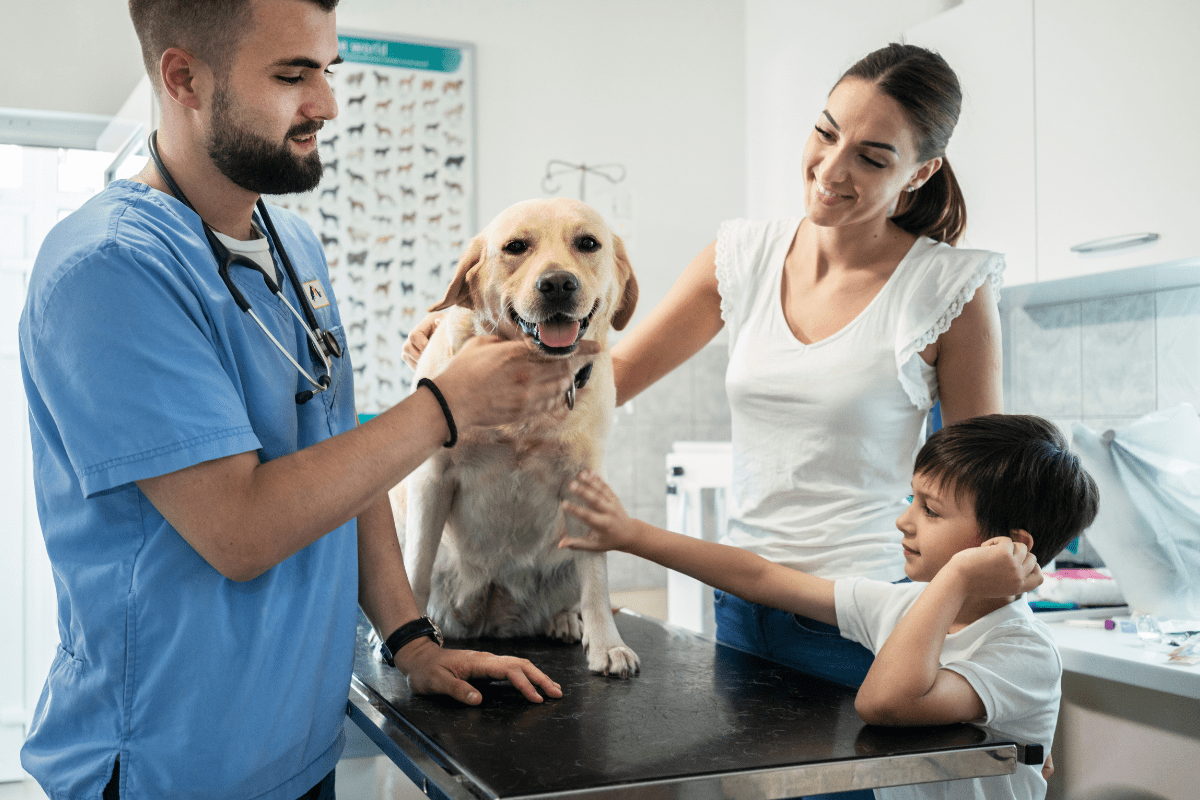At Metrovet Veterinary Clinic, we work with our clients to help them decide how to best care for their pets, including the use of vaccines (or combination vaccines) like the Canine Distemper Virus Vaccine.
Below you’ll find more information about this distemper-infected dogs and how to ensure your dog stays safe!
What You Need to Know About the Distemper/Parvo Disease
Distemper in dogs is a viral infection. Animals with Distemper suffer attacks on their respiratory, gastrointestinal, and neurological systems. The result can be gastrointestinal distress like vomiting and bloody diarrhea, as well as breathing and neurological symptoms.
A canine Distemper infection often causes significant long-term harm to your pet and can even be fatal. Distemper in puppies or immune-compromised adult dogs is extremely dangerous, so a vaccine is critical. If your dog isn’t on an annual vaccination schedule, it’s crucial to keep an eye out for distemper symptoms like loss of appetite, severe diarrhea, and any neurologic or respiratory signs.
How is the Canine Distemper disease spread?

Canine Distemper is a viral disease that easily spreads from an infected animal to another. Infection usually occurs from meeting an infected animal or through shared spaces such as boarding kennels. All it takes is dirty water bowls, a cough, bark, or sneeze to transfer the disease.
Dogs with Distemper are not the only way your pet may contract the disease. It is also found in wildlife populations and shed through feces or direct contact.
What dog breeds are at higher risk?

All breeds of dogs are at risk for Distemper, but young puppies or unvaccinated dogs are often the most susceptible to the airborne exposure that transmits the disease.
Protecting your puppy with the primary and booster vaccination for Distemper is the best way to keep them safe. If you have an adult dog, annual vaccines are recommended.
What are the common symptoms of Canine Distemper?

Distemper in dogs can cause vomiting, diarrhea, seizures, nose and eye discharge, coughing, lethargy, weight loss, and more. Neurological signs can include muscle twitches, loss of balance, seizures, and even paralysis.
Distemper is a deadly disease so if you believe your dog has been exposed, contact your veterinary clinic immediately. If your dog is not currently vaccinated, ask your vet about disease protection and what series of vaccines (whether an initial puppy series or core vaccination series) make sense.
What is the Canine Distemper treatment and diagnosis?
Usually, your vet will check for clinical symptoms in your dog. They will also likely complete diagnostic tests that can confirm if your pet has the disease.

There is no cure for Distemper, which is why antibody protection from vaccines is so important. Your vet can help you provide supportive care for your pet to ease symptoms such as nasal discharge, coughing, diarrhea, and more.
What are the best prevention methods for Canine Distemper?
The best prevention for Canine Distemper is vaccinations, along with reducing the risk of exposure to Distemper.
How Effective is The Distemper Vaccine?
Unfortunately, vaccines are not 100% effective against disease prevention. However, your dog’s risk of contracting Distemper is greatly reduced when administered properly. Always follow your vet’s recommendations and complete the proper dose of the Distemper vaccine to ensure maximum protection.
Why You Should Vaccinate Against Distemper/Parvovirus
The Distemper/Parvovirus is damaging and even deadly and can significantly impact your dog’s health. From respiratory and gastrointestinal issues to long-term neurological symptoms, we recommend protecting your pet from this canine disease to ensure their best long-term wellness.
Long-term Health Issues from Canine Distemper
Because there is no cure, dogs can often sustain long-term health concerns after contracting Distemper. These include neurologic symptoms such as seizures, nerve damage, brain damage, and more.
Canine Distemper Vaccine Schedule
-
- Puppies – Puppy shots typically begin after your puppy is weaned (usually between 6-8 weeks of age). From there, a booster vaccine may be administered every 2-4 weeks until roughly 14-16 weeks old.
-
- Adults – Most adult dogs receive vaccinations on an annual basis. At Metrovet, we use DAPP, which protects against Distemper, Adenovirus Type 2 (Hepatitis), Parvovirus, and Parainfluenza. The DAPP is a core vaccine, which means it’s recommended by the American Animal Hospital Association (AAHA) because it’s critical for your pet’s health.
At Metrovet, we’re here to help your pet live a healthy, happy life. Click here to schedule a vaccine appointment today!
You can also learn more about the other services we provide here.
Frequently Asked Questions
Want to learn more about how to protect your pet? Keep reading for answers to the most frequently asked questions.
Is the Canine Distemper vaccine necessary?
Yes. The Canine Distemper vaccine is a core vaccine, critical to your pet’s health. Because Distemper can be deadly, it is essential to protect your dog throughout their life with this vaccine.
Is the Distemper/Parvovirus Vaccine Required by Law?
Not usually. Unlike the Rabies Vaccine, which is typically required, the Distemper is not often required by law. It is recommended by the American Animal Hospital Association (AAHA) to protect your pet.
What happens if you miss a Distemper shot?
Talk with your vet about what to do if your dog misses a scheduled Distemper vaccine. At Metrovet, we can help you take the next step, whether you have an adult dog or a young puppy.
What vaccines do dogs need every year?
We recommend getting the core vaccines recommended by the American Animal Hospital Association (AAHA). These include a Rabies Vaccine and DAPP, which protects against Distemper, Adenovirus Type 2 (Hepatitis), Parvovirus, and Parainfluenza.
Do dogs have to get Distemper every year?
Yes. We recommend getting the Distemper vaccine annually during your pet’s routine wellness exams.
What are the first signs of Distemper in dogs?
The first sign is often watery eyes and discharge. From there, dogs often develop a fever, become lethargic, and exhibit symptoms such as coughing, vomiting, and diarrhea.
How do I keep my pet safe?
Beyond vaccines, there are many ways to keep your pet healthy and safe. Click here for a comprehensive list of questions you can ask your veterinarian about how to best care for your pet!

